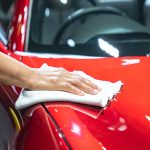Maintaining the pristine appearance of your beloved car involves navigating through a sea of cleaning products and methods. Among the myriad questions that perplex car owners, a common concern emerges: “Will alcohol hurt car paint?” In this in-depth exploration, we embark on a comprehensive journey into the intricate realm of car paint and the effects of cleaning agents. Let’s unravel the mystery behind the impact of alcohol on your vehicle’s paint and delve into expert insights on adopting safe cleaning practices.
Understanding the Basics
What is the Composition of Car Paint?
Car paint is not just a superficial layer of color; it’s a sophisticated blend meticulously engineered for durability and longevity. It typically comprises pigments, binders, solvents, and various additives. The outermost layer, known as the clear coat, serves as the frontline defense, shielding the paint from the relentless assault of environmental elements.
The Roles of Each Component
- Pigments: Provide color and opacity to the paint.
- Binders: Ensure adhesion and durability.
- Solvents: Aid in application and drying.
- Additives: Enhance specific properties like UV resistance and gloss.
The Impact of Alcohol on Car Paint
1. Breaking Down the Components
Alcohol, with its potent solvent properties, has the capability to break down the chemical bonds present in the paint. Understanding the molecular intricacies of this process sheds light on the potential risks and the specific vulnerabilities of each paint component.
2. The Delicate Balance: Clear Coat and Discoloration
The clear coat, a transparent layer atop the colored base coat, plays a pivotal role. Repeated use of alcohol-based cleaners may compromise this delicate balance, leading to concerns about discoloration. An exploration of the science behind color stability in automotive paint unveils the nuances of this interaction.
3. Solvents Beyond Alcohol
While alcohol is a prominent solvent in cleaning agents, it is not the sole player. We’ll examine how different types of solvents can impact the paint differently. This nuanced understanding is vital in making informed choices when selecting cleaning products.
Safe Cleaning Practices
4. Choosing the Right Products
Given the potential risks associated with alcohol, opting for alcohol-free or low-alcohol content cleaners designed specifically for automotive use is a prudent choice. We’ll delve into the market to identify top-notch products and understand their formulations for effective yet gentle cleaning.
5. Testing in Unseen Areas
Before subjecting your entire car to a new cleaning agent, conducting a patch test in an inconspicuous area is a recommended practice. This precautionary step allows you to assess the cleaner’s impact on your car’s paint without risking visible damage. We’ll discuss the significance of this test and how it can save you from unintended consequences.
6. The Art of Gentle Cleaning Techniques
The tools you use for cleaning are as important as the cleaning agents themselves. Utilizing soft microfiber cloths or sponges is crucial to minimizing abrasion. We’ll explore various cleaning techniques that are gentle on your car’s paint, ensuring longevity and preserving the protective qualities of the clear coat.
Common Myths Debunked
7. Alcohol as a Paint Stripper: A Myth Unveiled
There’s a prevalent myth that the alcohol content in typical cleaning agents is potent enough to strip paint. We’ll debunk this misconception by examining the chemistry behind paint strippers and comparing it to the alcohol levels in common cleaning products.
8. Alcohol and Car Wax Compatibility
Car wax is often considered a guardian of your car’s shine. But how does alcohol interact with car wax, and does it compromise the protective layer? We’ll explore the delicate balance between maintaining a glossy finish and using alcohol-based cleaners.
Editorial Recommendations
9. Consulting Automotive Professionals
Sometimes, seeking advice from automotive professionals is the best course of action. We’ll discuss the importance of consulting experts who can provide personalized recommendations based on your car’s make, model, and the specific composition of its paint. (See Also: How to Get Duct Tape Residue Off Car Window: A Comprehensive Guide)
10. DIY Alternatives: Crafting Your Cleaning Concoctions
For the DIY enthusiasts, we’ll explore alternative cleaning solutions. Homemade mixtures with mild soap and water can be effective without the potential risks associated with alcohol-based cleaners. We’ll provide easy-to-follow recipes and tips for preparing your own safe and effective cleaning concoctions.
Expert Tips for Preserving Your Car’s Paint: A Masterclass in Maintenance
Maintaining your car’s paint requires more than just routine washing. To ensure your vehicle stays gleaming and protected, here are some expert tips to consider:
1. Choose Wisely: Opt for Alcohol-Free Cleaners
When selecting cleaning agents, prioritize alcohol-free or low-alcohol content options specifically designed for automobiles. This minimizes the risk of compromising the integrity of your car’s paint layers.
2. Mindful Application: Patch Test First
Before applying any new cleaner, conduct a patch test in an inconspicuous area. This precaution helps you gauge the cleaner’s impact without risking visible damage to the prominent parts of your car.
3. The Gentle Touch: Soft Tools for Cleaning
Utilize soft microfiber cloths or sponges for cleaning. Harsh tools can lead to abrasions and diminish the protective qualities of the clear coat. Treat your car’s paint with the care it deserves.
4. Timing Matters: Regular Cleaning is Key
Don’t let dirt and contaminants linger on your car’s surface. Regular cleaning prevents the buildup of substances that can potentially harm the paint, ensuring a longer lifespan for your vehicle’s exterior.
5. Wax on, Wax off: But Mind the Alcohol
While waxing adds a protective layer, be cautious with alcohol-based cleaners. They can compromise the effectiveness of car wax, reducing its ability to shield your vehicle from environmental elements.
6. Seek Professional Advice: Consult Automotive Experts
When in doubt or dealing with specific concerns, don’t hesitate to consult automotive professionals. They can offer tailored recommendations based on your car’s unique makeup and the best practices for preserving its paint.
7. DIY Mixtures: A Balanced Approach
For the hands-on enthusiasts, explore DIY cleaning mixtures with mild soap and water. Create a balanced concoction that cleans effectively without jeopardizing your car’s paint integrity. (See Also: How to Remove Duct Tape Residue from Car Window – Expert Tips)
8. Protect from the Elements: Park Smart
Shield your car from the sun, rain, and other harsh elements by parking in covered areas when possible. This simple yet effective practice contributes significantly to the longevity of your car’s paint.
9. Regular Inspections: Detect Issues Early
Keep a keen eye on your car’s paint condition. Early detection of issues such as discoloration or paint damage allows for prompt intervention and prevents more extensive problems down the road.
10. Love Your Car: Regular TLC
Finally, the best tip is to show your car some regular tender loving care. Regular attention and a proactive approach to maintenance will keep your vehicle’s paint looking as vibrant as the day you drove it off the lot.
Frequently Asked Questions About Car Paint and Cleaning Agents
Navigating the world of car paint maintenance can be daunting, especially when faced with various cleaning agents and potential risks. Here are some common questions and expert answers to guide you through the process:
1. Will alcohol-based cleaners strip my car’s paint?
No, typical alcohol-based cleaners found in the market are not potent enough to strip car paint. However, consistent use over time may contribute to the deterioration of the paint layers.
2. Can alcohol-based cleaners cause discoloration?
Yes, frequent use of alcohol-based cleaners may pose a risk of discoloration. It’s essential to understand the thresholds and use these cleaners cautiously to prevent unwanted changes in your car’s appearance.
3. Are alcohol-free cleaners as effective as those with alcohol?
Yes, alcohol-free cleaners specifically designed for automotive use can be just as effective. These cleaners are formulated to clean without compromising the integrity of the paint layers.
4. How often should I clean my car’s exterior?
Regular cleaning is crucial to prevent the buildup of contaminants that can harm your car’s paint. Aim for a thorough wash at least once a month, or more frequently if your car is exposed to harsh conditions.
5. Can I use any soap for cleaning my car?
While mild soap is generally safe, it’s advisable to use cleaning products designed for cars. These products are formulated to clean effectively without causing damage to the paint or clear coat.
6. Is it necessary to wax my car regularly?
Waxing adds a protective layer to your car’s paint, enhancing its resistance to environmental elements. However, be cautious with alcohol-based cleaners, as they can compromise the effectiveness of car wax. (See Also: What is 303 Good For? Exploring the Uses and Benefits of 303)
7. What’s the significance of a patch test before using a new cleaner?
Conducting a patch test in an inconspicuous area allows you to assess the cleaner’s impact on your car’s paint without risking visible damage to prominent parts.
8. How can I protect my car from the sun and other elements?
Parking in covered areas when possible is an effective way to shield your car from the sun, rain, and other harsh elements, contributing to the longevity of your car’s paint.
9. Are there DIY alternatives to commercial cleaners?
Yes, for those who prefer hands-on solutions, you can explore DIY cleaning mixtures using mild soap and water. These can be effective without the potential risks associated with some commercial cleaners.
10. When should I consult an automotive professional about my car’s paint?
If you have specific concerns or doubts about your car’s paint, it’s advisable to consult automotive professionals. They can provide personalized recommendations based on your car’s make, model, and unique paint composition.
Conclusion
In concluding this comprehensive exploration, the question, “Will alcohol hurt car paint?” takes us on a fascinating journey through the intricacies of automotive paint, cleaning agents, and safe practices. Equipped with a wealth of knowledge, you can now approach car maintenance with confidence, understanding how to balance cleanliness with the preservation of your vehicle’s aesthetics.
Remember, caring for your car is not just a chore; it’s an art. Take your time, enjoy the process, and let your car shine as brightly as the day you first laid eyes on it!



